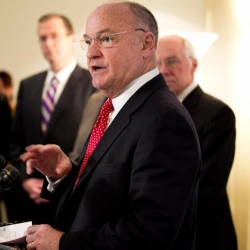
Mohegan Sun accused Stephen Crosby and the Massachusetts Gaming Commission with conducting an unfair licensing process.
The Supreme Judicial Court of Massachusetts allowed a lawsuit by Mohegan Sun against Wynn Resorts to proceed on Friday. The highest court in Massachusetts ruled that the lawsuit should return to a lower court for a decision.
In the ruling, the Supreme Judicial Court ruled that the Massachusetts Gaming Commission violated the “open meetings” law in the state while deliberating on a billion-dollar casino license near the City of Boston. Wynn Resorts was competing against a joint venture by Mohegan Sun and Suffolk Downs at the time.
Mohegan Sun Lawsuit
When the decision was announced in 2014, several groups joined in the lawsuit: Mohegan Sun, the International Brotherhood of Electrical Workers, the City of Revere, and a group of Revere residents. The Mohegan Sun/Suffolk Downs development was planned for Revere, one of the suburbs of Boston.
The Judicial Court ruled that Mohegan Sun had standing in the lawsuit, but the city and the workers union did not.
Instead of the Revere casino plan, the Gaming Commission chose Steve Wynn’s proposal to build a casino in Everett, another suburb of Boston. The lawsuit includes a number of complaints with the deliberations, which included allegations that the Gaming Commission’s chairman had financial ties to one of the Everett investors. That same chairman, Stephen Crosby, eventually recused himself from casino decisions.
When a leaker from the committee deliberation suggested Crosby was trying to manipulate the decision behind the scenes after his recusal, a Massachusetts government ethic agency launched a probe into Stephen Crosby’s conduct. That investigation eventually was dropped later in 2015 and members of the Gaming Commission resigned, but for many in Massachusetts, a cloud hung over the entire process.
Supreme Judicial Court: Civil Penalties Might Be Rewarded
The Judicial Court not only remanded the Mohegan Sun case, but it also ruled on the types of penalties which could be enforced by the lower court, if it found the Gaming Commission in the wrong.
The court ruled that the decision could lead to nullification of certain actions at open meetings or “other legal remedies”. The Judicial Court also noted that subsequent lower court decisions might result in civil penalties being awarded to the plaintiffs.
Kevin Brown Lauds the Decision
Kevin Brown of the Mohegan Tribal Gaming Authority released a statement saying the court decision affirmed Mohegan Sun’s contention that the Gaming Commission’s licensing process was flawed. A spokesman for the Mohegan Sun casino declined to say whether the casino or tribal authority would file a suit in the lower court or not.
It is expected that Mohegan Sun would file a case in the lower court, though the fact that the Wynn Boston Harbor development does not seem in danger of being axed might cause them to decline. Compensation is still a possibility, so that might call for a suit to be filed.
Wynn Boston Harbor Unaffected
A spokesman for Wynn Resorts said that the ruling has no effect on the $1.9 billion Wynn Boston Harbor development. The Wynn Boston Harbor is planned to open in the spring of 2019. When it opens, the Wynn National Harbor should draw most Boston-area gamblers, making it potentially one of the most lucrative brick-and-mortar casinos in the United States.
The Wynn Boston Harbor likely will hurt the revenues of Connecticut’s large tribal casinos, Mohegan Sun and Foxwoods Casino, which generated huge revenues in a time when gamblers from Boston and New York City visited their casinos. The opening of the MGM Springfield casino in Western Massachusetts also threatens the viability of Mohegan Sun and Foxwoods.
East Windsor Casino
In response, the Connecticut State Legislature gave the Mohegan and Maschantucket Pequot (Foxwoods) Tribes the right to build a third “satellite” casino in the Hartford metropolitan area. The casino, which Foxwoods/Mohegan Sun hope to place in East Windsor, is a joint venture to keep Connecticut gamblers from visiting Massachusetts casinos — especially the nearby MGM Springfield.
Massachusetts Casino Licensing Process
The Massachusetts casino licensing process might give the people of the state a bad taste. When Caesars Entertainment was eliminated in an earlier round of bidding, the Las Vegas casino company filed a lawsuit claiming Stephen Crosby had ties to an investor in the Everett real estate which Steve Wynn needed for the Wynn Boston Harbor. The investor had given Stephen Crosby a loan 20 years before at a time when Crosby was facing bankruptcy.
When Boston newspapers began to investigate the Everett land deal, they found that a convicted felon with alleged ties to the mafia was another investor. While that investor appears to have been a minor part of the Everett group, his presence made it impossible for Steve Wynn to buy the land from the group, due to Massachusetts gambling laws. Eventually, the City of Everett bought the plot of land, then sold it to Wynn Resorts at cost.
